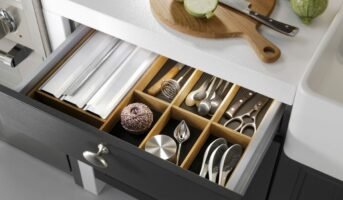The kitchen, often referred to as the heart of the home, is a space that requires regular maintenance and organisation to function efficiently. Over time, we tend to accumulate items that we seldom use or that have outlived their usefulness, leading to clutter and inefficiency. This article will guide you through 15 items that you should consider removing from your kitchen, followed by some handy kitchen maintenance tips to keep this essential space tidy and efficient.
See also: Importance of kitchen cleaning
Items to discard from the kitchen
Expired food
Begin your decluttering process by checking for expired food products in your pantry and refrigerator. These can occupy unnecessary space and also pose a health risk if consumed by mistake. Look at the expiration dates on all products and dispose of any that are past their prime.
Unused gadgets
Over time, we often accumulate kitchen gadgets that we thought would be useful, but rarely use. If you have any gadgets that haven’t been used in the past year, it’s likely time to donate or discard them to free up space.
Broken cookware
Any pots and pans with broken handles or peeling non-stick surfaces should be replaced immediately. Not only are they inefficient for cooking, but they can also be dangerous to use.
Mismatched tupperware
Tupperware or plastic containers that are missing their matching lids, or lids without containers, should be removed from your cupboards. These are often difficult to use effectively and just end up taking up valuable space.
Old spices
Spices do have a shelf life and can lose their flavour over time. If you have any spices that haven’t been used in over a year, it’s probably time to replace them.
Unused cookbooks
With the vast wealth of recipes available online, physical cookbooks are becoming less necessary. Keep only your favourites or those with sentimental value and consider donating the rest to free up space.
Old cleaning supplies
Check under your sink and remove any expired or almost empty cleaning supplies. These are ineffective and just take up space.
Chipped dishes and glassware
Dishes and glasses with chips not only look unsightly, but can also be a safety hazard. It’s best to replace these items.
Duplicate utensils
If you have multiple of the same utensils, such as can openers or spatulas, keep the one in the best condition and donate the rest.
Promotional items
Free items like promotional mugs, water bottles, or plastic cups can quickly clutter your cabinets. Keep only those that you actually use regularly and donate or discard the rest.
Unused small appliances
Small appliances like bread makers or ice cream machines that are not used regularly can take up a lot of space. Consider donating these items if they are just gathering dust.
Old sponges
Sponges can harbour a lot of bacteria and should be replaced every one to two weeks, depending on use. Dispose of any old or overly worn sponges.
Outdated medicines
If you store medicines in your kitchen, make sure to properly dispose of any that are expired. These can be dangerous if consumed and should not be kept in the kitchen.
Obsolete manuals
Many appliance manuals can now be found online, making paper versions unnecessary. Recycle any paper manuals to free up drawer space.
Unused furniture
In small kitchens, every bit of space is valuable. If you have extra chairs or side tables that are rarely used, consider whether you really need them. Donating or selling these items could free up a significant amount of space in your kitchen.
Kitchen maintenance tips
Regularly clean your appliances
Routine upkeep can extend the lifespan of your appliances. This includes cleaning the oven, defrosting the freezer and descaling the kettle.
Organise your pantry
An organised pantry not only looks good but also makes cooking easier. Use clear containers for bulk items and label everything for easy access.
Deep clean regularly
At least once a season, give your kitchen a deep clean. This includes washing the windows, cleaning under the sink and wiping down the insides of cabinets.
Maintain your knives
Regularly sharpen your knives to keep them in good condition. A blunt knife may pose a greater risk than a sharp one.
Regularly check for pests
Regularly check for signs of pests like mice or cockroaches, especially in the pantry where they might be attracted to food.
A clean and organised kitchen is a joy to cook in and spend time in. By regularly decluttering and maintaining your kitchen, you can ensure it remains a functional and pleasant space. Remember, a tidy kitchen isn’t just about appearances – it can also significantly enhance your cooking efficiency and meal preparation experience.
FAQs
How often should I declutter my kitchen?
It's advisable to declutter your kitchen at least twice a year, but doing so seasonally could be even more beneficial.
How can I keep my kitchen organised?
Apart from regular decluttering, consider using drawer organisers, shelf risers and clear storage containers to keep everything in its place.
How often should I replace kitchen sponges?
Kitchen sponges should be replaced every one to two weeks, depending on use.
How often should I deep clean my kitchen?
It's recommended to give your kitchen a deep clean at least once a season or every three months.
How can I dispose of old kitchen appliances?
Many cities offer appliance recycling programs. Alternatively, if the appliance is still in working condition, consider donating it.
How should I store my kitchen knives?
It's best to store kitchen knives in a knife block or on a magnetic strip. This prevents the blades from dulling and reduces the risk of accidental injury.
What should I do if I find pests in my kitchen?
If you find pests in your kitchen, consider hiring a professional exterminator. To prevent pests, keep your kitchen clean, especially the areas where food is stored.
| Got any questions or point of view on our article? We would love to hear from you. Write to our Editor-in-Chief Jhumur Ghosh at [email protected] |

Upasana Mandhata, currently in her final year of Law, is pursuing a BA LLB Degree at VIT University Chennai. Her interest in content creation dates back to her school and college years when she discovered a writing passion. Drawing from personal experiences, her writing style has been shaped by her journey and encounters. She enjoys experimenting with new recipes, painting, or swimming while clocking out of work time.











